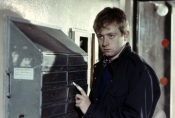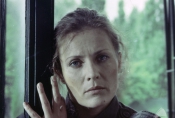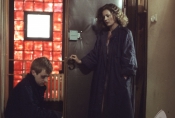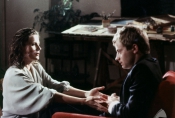A SHORT FILM ABOUT LOVE [1988]
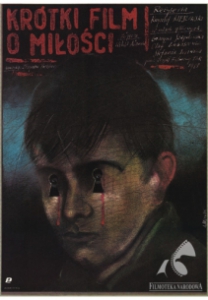
year:
- 1988
runtime:
- 83 min
directed by:
- Krzysztof Kieślowski
written by:
- Krzysztof Piesiewicz, Krzysztof Kieślowski
director of photography:
- Witold Adamek
cast:
- Grażyna Szapołowska [Magda], Olaf Lubaszenko [Tomek], Stefania Iwińska [Tomek’s landlady], Piotr Machalica [Roman, resident of Magda’s block of flats], Artur Barciś [man with a suitcase]
music by:
- Zbigniew Preisner
produced by:
- Zespół Filmowy Tor, Wytwórnia Filmów Dokumentalnych
producer:
- Ryszard Chutkowski
awards:
-
• Gdynia Film Festival 1988 – Grand Prix for Krzysztof Kieślowski ("Golden Lions")
• Gdynia Film Festival 1988 – award for best actress in a leading role for Grażyna Szapołowska
• Gdynia Film Festival 1988 – award for best actress in a supporting role for Stefania Iwińska
• Gdynia Film Festival 1988 – best photography award for Witold Adamek
• Gdynia Film Festival 1988 – best screenplay award for Krzysztof Kieślowski
• Gdynia Film Festival 1988 – best screenplay award for Krzysztof Piesiewicz
• San Sebastian (MFF) 1988 – Special Award of the Jury for Krzysztof Kieślowski
• San Sebastian (MFF) 1988 – FIPRESCI award for Krzysztof Kieślowski
• San Sebastian (MFF) 1988 – OCIC award for Krzysztof Kieślowski
About the film
Kieslowski's film is ascetic in terms of the plot, but extremely rich psychologically. It shows with rare subtlety the internal transformation of a young man and a mature woman, seemingly devoid of any higher emotions. In the dramatic course of their "affair", they both discover that they are capable of love. That love is something he has never experienced before, and she probably doubted its existence. Critics universally praised the performances by Grażyna Szapołowska as Magda and Olaf Lubaszenko as Tomek. One reviewer wrote: "Szapołowska proved that her natural acting talent has developed into mastery. The performance of her young partner, Olaf Lubaszenko, showcases all the most important aspects of Tomek’s character: the gawky, awkward youthfulness, with the nugget of a precious stone hidden somewhere deep."
One of Warsaw's housing estates. Living in a small room rented from his friend’s mother is nineteen-year-old Tomek, an unremarkable and very sensitive boy. In the evenings, he studies foreign languages, but at 9 PM, he uncovers a telescope standing on his table and looks through the lens. The device is pointed at the window of the flat opposite his room. Tomek does not know the woman who walks into the flat, but he has been watching her through the window for a long time. Magda is a mature woman, presumably an artist because unfinished tapestries are hanging in her apartment. She does not realise that her every move is watched by the boy. Initial boyish curiosity turns into a deeper feeling. Tomek loves Magda and tries to do everything in his power to get closer to her. One evening, a man visits Magda. The boy is unable to watch the intimate unfolding scenes. But when he sees the man dialling a phone number and tenderly talking to someone after he has left Magda’s flat, he is convinced that he is doing something unfair to her. Tomek takes revenge and cuts the tyres of the man’s car parked in front of the building.
Tomek works at the post office, but also accepts the job of milkman in order to be able to look at Magda sometimes. He also tries other ideas. In order to get her to come to the post office, he puts a notice of transfer of funds in her post box. When one evening she receives a visit from that man again, Tomek cannot bear it, so he calls the gas emergency sevices to her flat. He watches the unfolding scene with great satisfaction. One night, the boy is witness to the dramatic scene of Magda breaking up with her man. The upset woman runs to her flat, sobbing. Tomek cries with her. In the morning, he puts another fake notice into her post box. The woman shows up at the post office. Accused by employees of trying to extort money, she runs outside, upset. Tomek rushes after her. For the first time, he has a chance to talk to Magda. He tells her everything – that he has been watching her and that he loves her. The upset woman leaves him standing in the street. In the evening, the boy anxiously looks through his telescope in the direction of Magda's flat. She arranges a show for him. When her man arrives, she pulls him into bed only to tell him about Tomek at some point. The man gets up immediately and runs in front of the building. He calls the boy, and when the latter comes out, he just beats him up. In the morning, beaten Tomek delivers the milk. Magda opens the door and talks to him calmly. The boy shyly suggests meeting in a cafe. After the meeting, Magda invites Tomek to her flat. She is tender and welcoming, but after they are intimate, she speaks with cynicism about what has just happened. Crushed Tomek, seeing her cool gaze, flees to his room and cuts his veins. The landlady calls an ambulance and Tomek is taken to hospital. Meanwhile, Magda is anxious. She learns that the boy is in hospital, but she does not know why. She tries to find him, but she does not even know his name. She goes to see Tomek’s landlady. The woman shows her to his room, where the telescope is set. She says that the boy has fallen in love. Tomek returns from the hospital and Magda immediately runs to his flat. However, the landlady does not allow her to wake the sleeping boy. The woman looks through the telescope at her flat – her imagination runs wild with scenes that involve her with Tomek. [Jadwiga Korycka; Film Service Prasowy 198/18]
Articles
-
Krzysztof Kieślowski: Je t’aime… Moi non plus
Grażyna Arata
Świat według Kieślowskiego/The World According to Kieślowski, Editor: Barbara Kurowska, Publisher: Muzeum Kinematografii w Łodzi, 2011
-
Krzysztof Kieślowski: Je t’aime… Moi non plus
Grażyna Arata
Świat według Kieślowskiego/The World According to Kieślowski, Editor: Barbara Kurowska, Publisher: Muzeum Kinematografii w Łodzi, 2011
